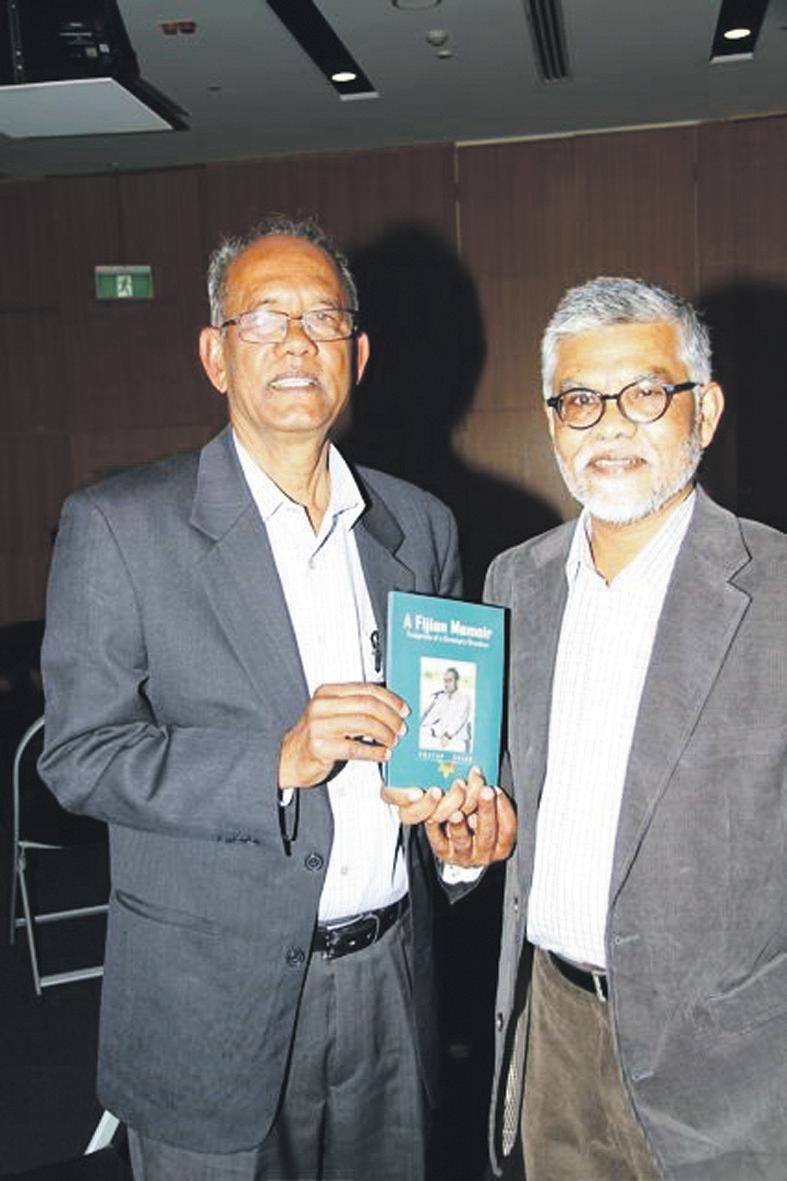
17 minute read
Memories of former Fiji
from 2013-09 Sydney (1)
by Indian Link
A vanished world comes alive for Fiji Indians at Blacktown book launch
By AsHA CHAND
Acrowd of more than 200 Fiji Indian Sydneysiders took an emotional trip back to Fiji when they converged at the Blacktown City Library recently for the launch of Pratap Chand’s book, A Fijian Memoir: Footprints of a Girmitya’s Grandson
Chand, a former education minister in Fiji’s Labour Government and a schoolteacher turned trade unionist, recollected the living experiences of village life amid the perils of dire poverty. Through 15 chapters of his book he presented the carefree spirit of the Fiji Indians, their resourcefulness, capacity to share, celebrate and mourn together, and their value for education.
Brij Lal, Professor of Pacific and Asian History and director of the School of Culture, History and Language at the Australian National University, launched the book amid much pomp and ceremony.
Speaking at the launch, Pratap Chand said the book was his first attempt at “writing by remembering”. The project took him a few years to complete as he had to shift priorities, especially when his wife became ill.
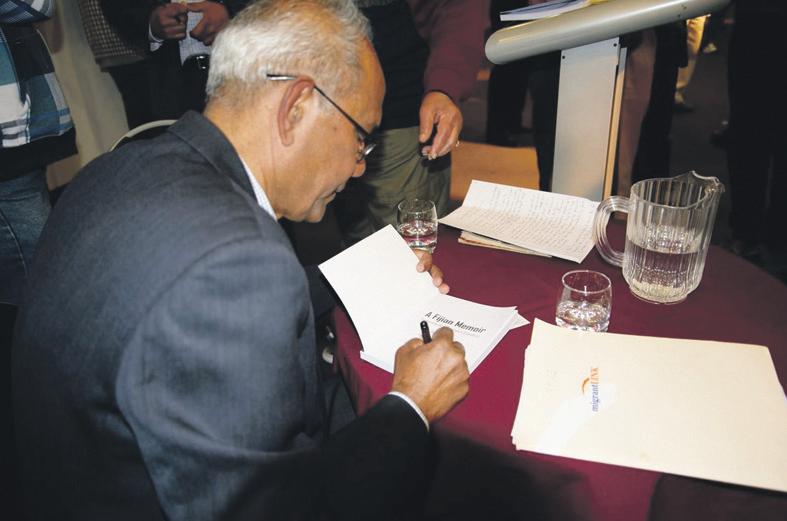
“I also took time away from the project to care for and raise my grandchildren,” he said.
Chand said he was grateful to his ‘teacher colleagues,’ trade union supporters as well as those who believed in his work ethics when he was a government minister in Fiji. Apart from family and friends, the largest support for the launch was from former teachers from Fiji, most of who either worked with Chand or served under him when he was a minister. Roshan Lal, formerly of Waibuka, Ba who attended the event said that he remembered the leading role Chand played in ensuring children attended school.

“We always wanted to do the right thing as students because kaka (uncle) would always question us about our progress at school. We used to be scared when mum would tell us about his visits to our village,” he stated.
Chand recalled how he would travel to villages in the outback where the Fijian communities would lay the red carpet for his welcome.
“These villages could not afford much but they would put on a grand show because a government minister was coming to their village.
I took pride in serving these villages through better education for their children,” he stated.
Chand said he remembered his own childhood in Fiji as being filled with adventure and fun. He said although they had very little, the Indians in Fiji always worked hard and reached out to help those within their networks. “The Indian community was focused on education and we as a community in Sydney today are benefiting from that investment,” he said.
Prof Lal, a living testament of the power of education, was then invited to launch the book which was sold out on the day.
Reminiscing on the life that was, Prof Lal, himself a son of Fiji who has attended international forays as a voice on Fiji’s history and politics, said the book was an archive of memories of a world disappearing before our eyes.
Touching on the fundamental demographic change that has reshaped Fiji since the 1987 military coup, Prof Lal said that in the 1970s Indians comprised around 50% of the country’s population. “They were the outright majority of the population, with all the fears and phobias that that generated. But now their numbers have declined to around 32%, and going further down, while the iTaukei (indigenous Fijians) now are around 60% of the population”.
Prof Lal predicted that with the changing shifts in the centre of gravity, a time will come when people will find it difficult to believe that Indians were once a majority in Fiji.
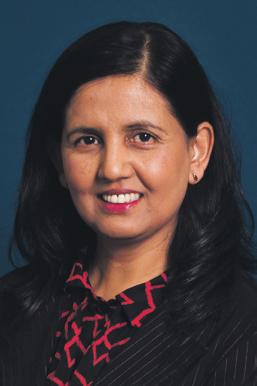
He lamented, “The best and brightest have left; those still in Fiji would leave if they could. Now, Sydney, Melbourne, Brisbane, Auckland, Wellington and Vancouver are the new beacon of our people”.
Pointing to these ‘massive’ changes and transformations, Prof Lal called on the audience to pen their own memoirs. “If we don’t write about ourselves, who we are, where we have come from, our hopes and aspirations and fears; who will?” he asked.
Presenting the essence of the book which he initially read in its embryonic form almost a year ago,
Prof Lal said at its most basic level the book presented the story of a personal journey. The story of a boy growing up in pre-modern times, without electricity or running water, reading by the flickering wick lamp in the silence of a thatched bure, completing primary school and through sheer effort and determination completing university education and making forays into public life.
“In the course of telling his story, Pratap makes a vanished world come alive. He writes about games children played in the village (gullidanda, suri and hopscotch), about festivals that celebrated life, and the rituals and ceremonies that mourned its passing,” Prof Lal said.
The close-knit communal life that Chand described and celebrated in his book was typical of Indo-Fijian villages all around the country. This life, however, has disappeared in many places as cane leases have not been renewed and evicted tenants have drifted to the mushrooming squatter settlements fringing urban centres all around Fiji, where between 15-20% of the total population lives.
“The book is in a very real sense, Pratap’s tribute to that vanishing world that so formed and deformed our lives. Pratap uses his personal experience to reflect the broader forces and influences of history and the processes of social change of which he has been a part, of which he is a product,” he stated.
Prof Lal explored Chand’s antecedents, explain the concepts of girmitiya, and girmit (indenture) in detail. He touched on Chand’s treatment of education, stating that it was written “with intimate familiarity, from the inside as a student, teacher and administrator”. He mentioned the changes in literature that had shaped Fijian education, citing examples from traditional English and Hindi readers. “Pratap is absolutely right to emphasise the centrality of education in our lives,” said Prof Lal.
The highlight of the launch was when Professor Lal showed the audience his own treasured collection of first books, to amazed applause as the majority of attendees had also read the same textbooks.
Prof Lal then enumerated on university education, as propounded by Chand in his book. He explained how opening the University of the South Pacific in 1968 led to greater opportunities for higher education among the youth of Fiji. “Tertiary education was made available to children from poor homes who could not afford to go abroad. That was how I was able to go to university; that is how Pratap did. The USP was the central catalyst for the emergence of the Fijian middle class of which both us are a part,” he stated.
Chand plans to launch his book in Brisbane and Auckland before the end of this year. “I am waiting for more copies to be published,” he said.
Hindu pilgrims make the arduous 14km trek from the basecamp Hadsar in the Himalayas to Manimahesh Lake, during the annual Manimahesh pilgrimage at Bharmour, on 28 August 2013
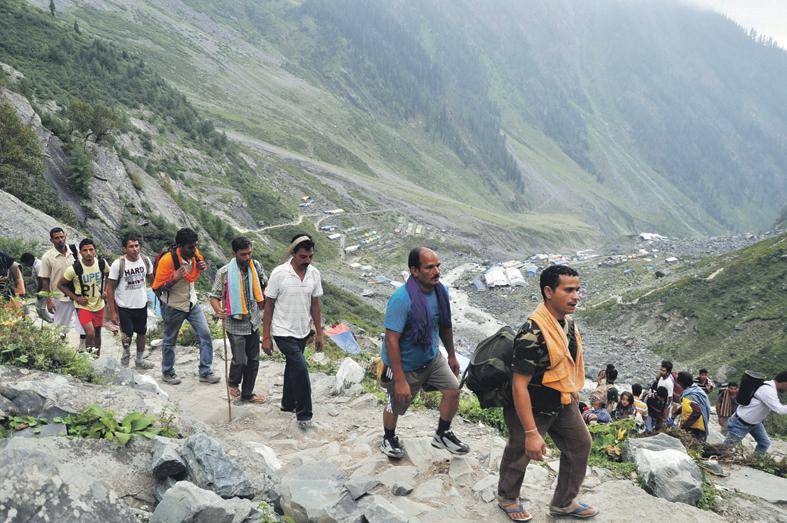
Parliament approves food security for 800 million Indians
Parliamentary approval was accorded to the landmark Food Security Bill recently in New Delhi, which gives right to subsidised grains to two-thirds of India’s 1.2 billion population numbering around 800 million, the largest such scheme anywhere in the world.
Under the legislation, beneficiaries would get five kg of grain per person, per month, which would include rice at Rs.3 per kg, wheat at Rs.2 per kg and coarse grains at Re.1 per kg.
The Lok Sabha passed the bill August 26 while the Rajya Sabha cleared it on the night of September 2 after 237 amendments tabled by opposition parties were rejected or not pursued.
After the bill was passed, Food Minister K.V. Thomas told reporters he was “happy that it was passed unanimously”.
In his reply during the 10-hour-long debate, he had attempted to allay opposition concerns, assuring that existing state schemes and their grain allocations will be protected.
The bill, introduced in parliament in December 2011, will now go to President Pranab Mukherjee for his assent before it becomes law.
The legislation, a pet welfare measure of Congress chief Sonia Gandhi and a part of the Congress election manifesto of 2009, is expected to be a game-changer for the party ahead of the assembly polls in five states this year-end and the 2014 parliamentary elections.
Apprehending that, opposition parties have called it a vote security bill.
The measure, which is expected to entail an expenditure of around Rs.1.30 lakh crore, has also been criticised on the ground that it would further stress a slowing down economy and a sliding rupee.
The Congress says that the additional subsidy burden of around Rs.28,000 crore can be taken care of and would not affect the fiscal deficit.
Incidentally, while Gandhi was taken ill on the day the lower house passed the bill, she flew abroad for a medical check-up on the day the upper house approved it.
In the Lok Sabha, she had strongly defended the bill, saying was a “historic step” to weed out hunger from the country.
In a speech heard in silence, Gandhi, 66, declared, “The food bill is meant for the less fortunate sections of our society. It is a historic step to eradicate hunger”.
“It is time to send out a big message that India can take the responsibility of ensuring food security for all its citizens,” she added to loud thumping of desks by ruling coalition members.
The real challenge for the Congress is now to get the bill rolled out, a responsibility entrusted with the state governments.
Most parties in the lower house supported the bill while expressing reservations on many of its provisions.
This repeated in the Rajya Sabha where most parties supported the legislation but wanted the government to approve the changes suggested by them.
Leader of Opposition Arun Jaitley of the BJP said the bill was mere “repackaging” of existing schemes in different states, and criticised the “hurry” to push through the legislation.
“The BJP supports food security for all, but opposes the way in which it has been introduced and certain contents of the bill,” he said.
“On one hand, the government is providing cheap food to people and on the other, (it is) increasing fuel prices,” said Communist Party of India-Marxist’s Sitaram Yechury.
“There are lots of states which give more. Don’t reduce the entitlement of states,” he said.
The Trinamool Congress said certain provisions in the food bill are making mockery of the country’s federal structure.
“This bill says the state will have to comply with whatever directions the central government gives... This is mockery of federalism,” TMC leader Derek O’Brien said.
Bahujan Samaj Party chief Mayawati said several central government schemes for the poor have failed to benefit them in the past, so efforts should be made to ensure proper implementation of food scheme.
Both Mayawati and Samajwadi Party leader
Naresh Aggarwal said the centre should have consulted the chief ministers before bringing the bill.
“Many political parties are linking food bill to coming general elections... we also see truth in this,” said Mayawati.
The bill proposes meal entitlement to specific groups, including pregnant women and lactating mothers; children between the ages of six months and 14 years; malnourished children; disaster-affected persons; and destitute, homeless and starving persons.
The measure envisages food grain entitlement for up to 75% of the rural population and up to 50% of the urban population. Of these, at least 46% of the rural population and 28% of the urban population will be designated as priority households. The rest will be designated as general households.
Good people are there on both sides of border:
Pakistani traders
Pakistani traders who visited India, insist that good people “happen to be on both sides of the border” and they were happy to share bonds with their Indian counterparts that was “lifelong”.
Pakistani handloom and handicraft traders took part in the Dastkar South Asian Bazaar held at the Dilli Haat August 23-September 1 in New Delhi.
They said such cultural initiatives not only promote business, but forge a lifelong relationship between the people of two countries.
“Our relations are not delicate like political relations that will evaporate in a day” said Shahid A. Bundu Khan, owner of the Bundu Khan chain of restaurants. “We share a bond that is lifelong and is formed on the strong foundation of love”.
“This too is our janambhoomi (place of birth). My great grandfather was from India, so we very much belong here,” Bundu Khan said. “Political tensions between the two countries will always be there, but people from both sides want peace”.
His grandfather entered the business in 1948, and their “grill specialities” are very popular in Pakistan, he said.
Nine groups from Pakistan came to India via the Wagah border in Amritsar. They brought with them flavours from various regions - intricate embroideries from Sindh, popular lawn fabric from Karachi, exquisite furniture carved in semi-precious onyx stone, and heavy gabba (carpet) work from Abbottabad.
Though their business was “average” considering the amount of money they had to pay for customs, and a tax of 11.35% on the sale of each product, yet the enthusiasm to be in India kept the Pakistani traders going.
“Custom duties are astonishing,” said Maihzaib Khan who represented the Sindh Women Chamber of Commerce. “We haven’t made profit but there isn’t loss either. The moment people hear ‘Pakistan’, they are excited to see us and talk to us with warmth and much respect”.
Maihzaib said her “multani” embroidered kurtis were much appreciated. On her first visit to India, she said “this feels like a second home,” and that she will be more than happy to come back again.
Khalida Khan was a bit apprehensive about how they will be received as tension between India and Pakistan had aggravated recently. “It all went well,” said Khan, with a sigh of relief. She was referring to the August incident in which five Indian soldiers were killed as Pakistan violated the ceasefire along the Line of Control in Jammu and Kashmir.
“We were wondering how we will be accepted post the recent tensions between the two countries. But people have been kind, and we have been received well,” Khalida said.
The war clouds will always play hide and seek, and political gains will keep skirmishes going, but Bundu Khan feels love across the border will always find new ways to communicate.
“If you cut my hand, can you tell me from the colour of my blood whether I am from India or Pakistan?” he asked.
“People want love not war,” he said. “Good people happen to be on both sides of the border and they will always find a way out to meet. Initiatives like this are bridges to bring people together. Let’s hope we have many more strong bridges in future. It is good for people and great for business”.
India not going through 1991like crisis: Washington’s CFO
Excessive self-criticism is sending the wrong signals to foreign investors and the current economic scenario in India is not comparable with the 1991 crisis when the country was forced to pledge its gold to pay import bills, an Indian-American money manager has said recently in New Delhi.
“I don’t think India is going through a 1991 like crisis. That situation was different. It’s not comparable,” said Natwar Gandhi, 72, chief financial officer of Washington DC, who is credited with the fiscal turnaround of the US capital from near bankruptcy in 2000 to a surplus budget today.
“Foreign investors are withdrawing money not because something has suddenly gone wrong with the Indian economy. This is more to do with the US central bank’s move,” said the Gujarat-born Gandhi in an exclusive interview on a visit in New Delhi to share his experience on urban governance.
An alumnus of the Louisiana State University, Gandhi was alluding to the US Federal Reserve’s hints at easing the fiscal stimulus that has been in force since 2008 to ward off the economic crisis, which experts say have hit currency markets in a host of countries, including India.
Foreign funds have pulled out over $12 billion from Indian debt and equities markets since the US Federal Reserve hinted at tapering stimulus in late May. This has led to almost 20 percent slump in the value of Indian currency against US dollar and a sharp drop in stock markets.
Gandhi said the huge pulling out of money by foreign funds from the Indian markets was linked largely to the US Federal Reserve’s comments.
He said excessive self-criticism and political compulsions were adding to the volatility in the currency markets. “There are problems, but I see a great deal of selfcriticism. Excessive self-criticism sends wrong signal to the foreign investors,” he said.
Gandhi said India is passing through very a difficult economic situation, even though the condition is not as critical as it was in 1990s.
In 1991, India was forced to pledge its gold in order to pay its bills as the country’s foreign exchange reserve had fallen to $3 billion, not enough even to cover three weeks of imports. Today, the foreign exchange reserve is nearly $280 billion that can cover seven months of imports. Besides, the central bank has more tools to manage volatility in the currency markets.
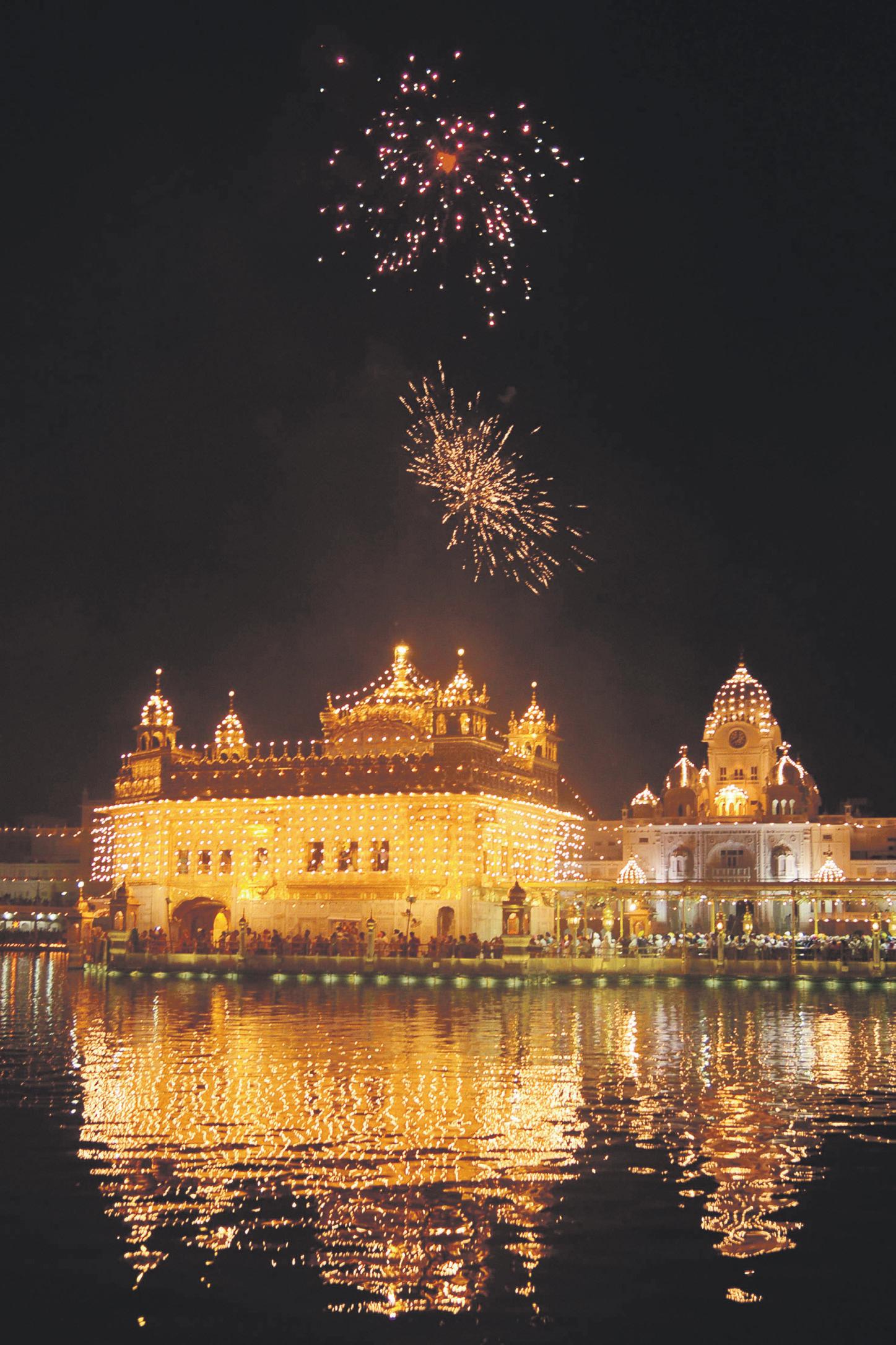
Gandhi pointed out that the 1991 crisis had acted as a trigger for economic liberalisation, and the Indian government must take similar bold reform measures to emerge stronger out of the crisis.
“You have to liberalise more,” he said. “This is the only long lasting solution to these kind of economic problems”.
As chief financial officer of the District of Columbia, in which Washington falls, Gandhi is responsible for the city’s finances, including its nearly $7 billion in annual operating and capital funds. He has built on the city’s financial progress by securing multiple rating upgrades from the major rating agencies for its general obligation bonds.
He said implementation is a major problem in India and it is a big drag on the country’s economic performance.
“I understand that the government has political compulsions. But they must act. They must have a bold vision,” said Gandhi.
On opening up of India’s retail sector for foreign investment, Gandhi said resistance to the move was natural given its impact on a large number of small traders.
“In Washington, there has been substantial resistance against Walmart,” he said. “It is facing similar resistance in other cities of the United States. No wonder, similar resistance is going on in India as well”.
However, he emphasised that the opening up of retail sector was good for consumers in India and the economy, and the government must implement the decision and encourage foreign supermarket operators to set up shops.
Defining moment as IAF inducts C-17 heavy-lift transporter
With Defence Minister A.K. Antony terming it a “defining moment”, the Indian Air Force (IAF) formally inducted the Boeing C-17 Globemaster III heavy-lift transport aircraft at a function in Hindor, UP.
Of the 10 C-17 aircraft ordered, three have been delivered to the IAF while two more will be delivered this year and the remaining five in 2014.
The squadron will be based at the Hindon air force station.
“This is a giant stride for the air force,” Antony said, adding: “India and the US have had a long-standing partnership and this is another milestone”.
The C-17s will boost the IAF’s capability to transport troops and heavy equipment such as main battle tanks to the front, thanks to its ability to carry around 80 tonnes of load.
According to IAF chief, Air Chief Marshal N.A.K. Browne, the mighty aircraft would by US aviation giant Boeing, will be operated from advanced landing grounds in north and northeastern India.
The IAF’s C-130J Super Hercules mediumlift aircraft had last month landed at the highest airstrip in the world - the Daulat Beg Oldie in Ladakh close to the Chinese border - the region in which the two Asian giants were engaged in an impasse in April.
A spate of Chinese intrusions in the past few months has created tensions between the two south-east Asian giants who share a border of length around 3,500 km.
The C-17s will boost India’s plan to strengthen its capabilities along the disputed border with China.
Tiger numbers go up in Bihar
The number of tigers in Bihar’s only tiger reserve has more than doubled in the last three years, an official said recently in Patna.
“We have counted 22 tigers in the reserve at present on the basis of camera trap census,” Santosh Tiwari, director-cumconservator of the Valmiki Tiger Reserve in West Champaran district said.
He said census was conducted by the VTR management in collaboration with World Wildlife Fund (WWF)-India.
Tiwari said the number of tiger was only 10 till 2010. “In last three years, the population of tigers has jumped like never before in the 899sq km reserve”.
He said that all of us including forest guards are happy. “This positive development is a matter of celebration,” Tiwari said.
He said the National Tiger Conservation Authority (NTCA) would be informed about it soon.
According to him, VTR had started the tiger census work in February this year and 210 camera traps were used across the reserve for collecting data till June.
He attributed a friendly environment in the reserve for increasing number of tigers.
Tiwari said the improvement in the condition of grasslands, spread over 450 hectares, have been attracting the big cats for the last few years to the reserve, nearly 200km from Patna.
Besides, intensive patrolling by local youth played a major role to check entry of poachers and others in the reserve.
“Tigers are more safe than before,” he said.
Tiwari said that a tigress gave birth to three cubs in the reserve a few months ago - the second such development in the area in oneand-half years.
Manmohan Singh launches Mahatma Gandhi portal
Prime Minister Manmohan Singh recently launched a portal aimed at making Mahatma Gandhi “accessible all over the world”.
“Mahatma Gandhi is not only in our past, he is in our present and will also form a significant part of the future that we want for the country and its people,” he said in New Delhi.
He said he was confident that the ‘Gandhi Heritage Portal’ would be an invaluable resource for generations to come, especially for the youth.
“It is a self-evident truth that knowledge has to be an inclusive process, where barriers to learning are systematically dismantled,” he said. “Only a society that is committed to the free flow of ideas can hope to lead in an age of knowledge”.
“Our government has taken many significant steps in this direction. The National Manuscripts Mission, the Digital Library of India and the Gandhi heritage portal are all important milestones in this journey,” he said.
The portal is a technology-driven initiative aimed at making Mahatma Gandhi accessible all over the world on an electronic platform.
“It aspires to be one of the most authentic open source archives on the life and thoughts of Mahatma Gandhi,” said Manmohan Singh.
The prime minister said, “This collection of documents provides great source material on our freedom struggle and captures the triumphs and tribulations, the thoughts and visions of an entire generation led by Bapu”.
“We are keen that a world-class national memorial should soon come up at Dandi (Gujarat), which will inspire the younger generation,” he said.
The portal, which will house the intellectual heritage of Gandhi, has been developed at the Gandhi Ashram in Gujarat’s
Sabarmati, where its office is also located.
The culture ministry had sanctioned Rs.8 crore as a corpus fund to the Sabarmati Ashram Preservation and Memorial Trust (SAPMT), Ahmedabad, to create the portal. The trust would earn about Rs.75 lakh as annual interest to run and maintain the portal.
Mobile app to help girls facing sexual threats
A new mobile phone app that aims to help report sexual harassment to authorities would be pilot-tested by girl students of Jamia Millia Islamia shortly in New Delhi, an official said.
Through the new app called Safetipin, users can conduct a spot safety assessment through their smartphone and upload information and pictures.
The app includes a feature called “wall”, where users can view and become aware of all recorded information in their neighbourhood and other defined locations and participate in an interactive environment.
The mobile app would help users upload information on harassment, along with sharing information about police stations and hospitals.
“In collaboration with Jagori, a nongovernmental organisation, Jamia is going to organise an interactive presentation on operationalising women’s security and a demonstration on ‘Safetipin’ Monday,” said Simi Malhotra, the university’s media coordinator.
IANs










